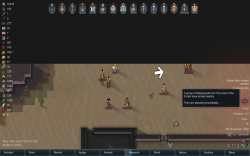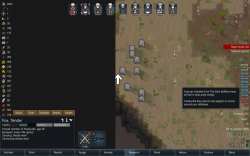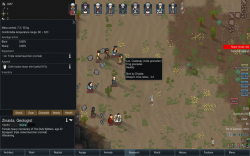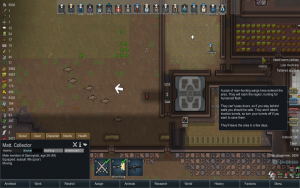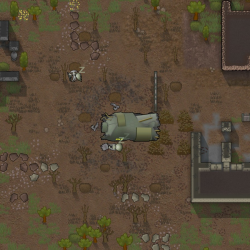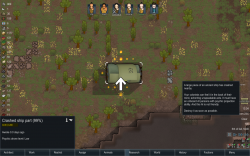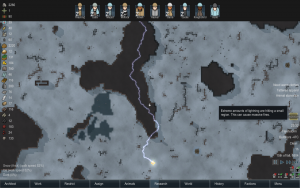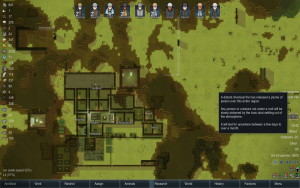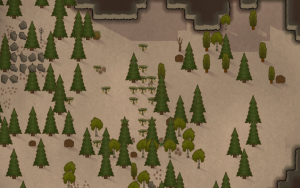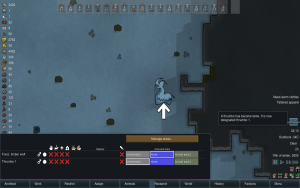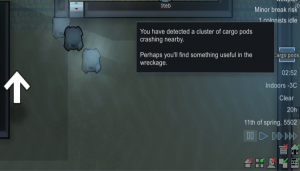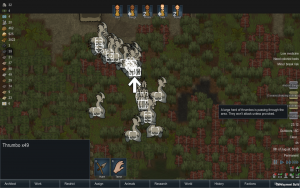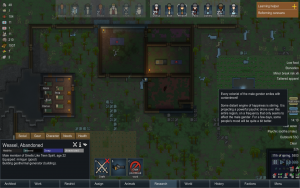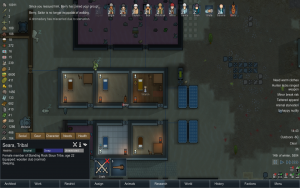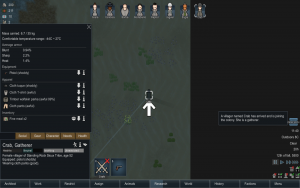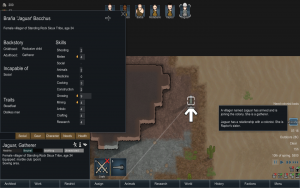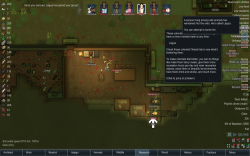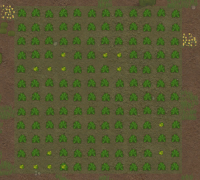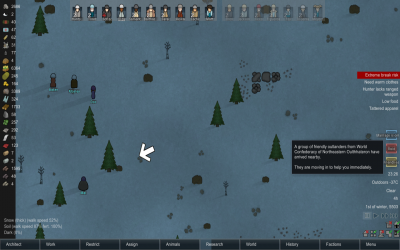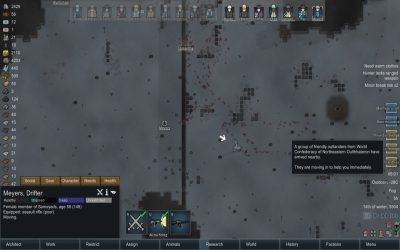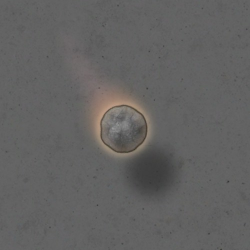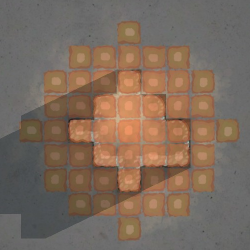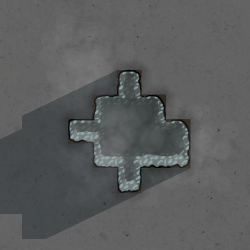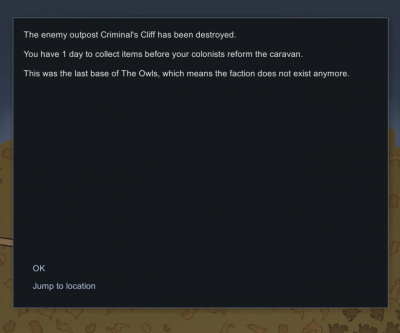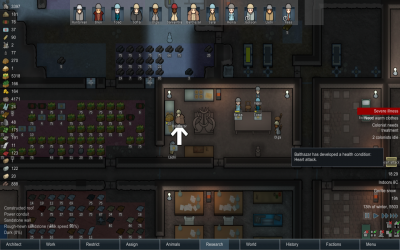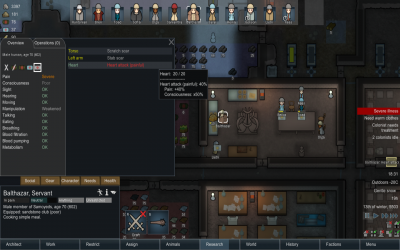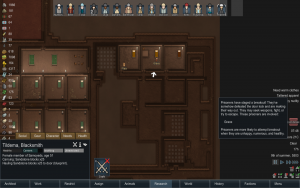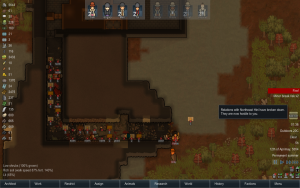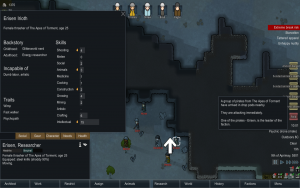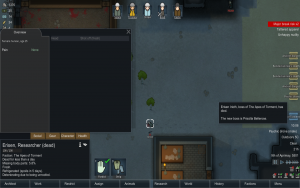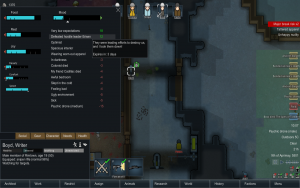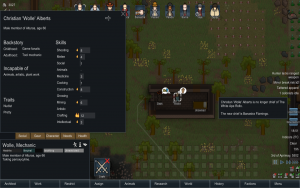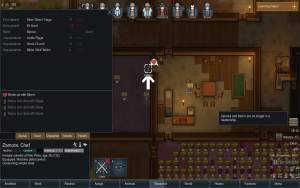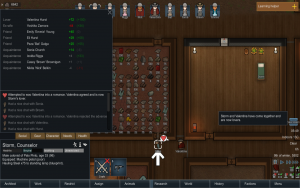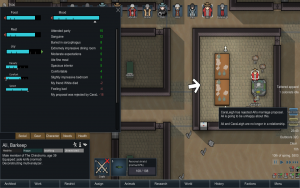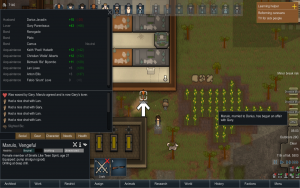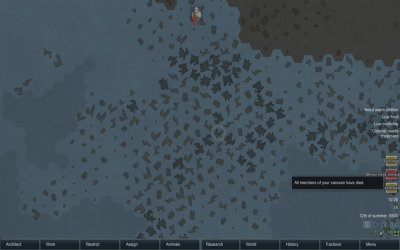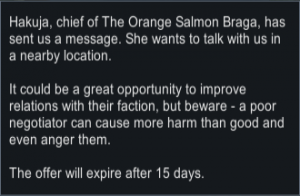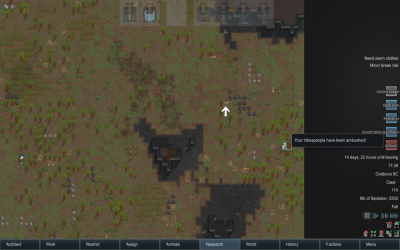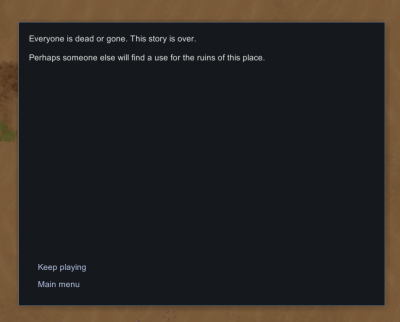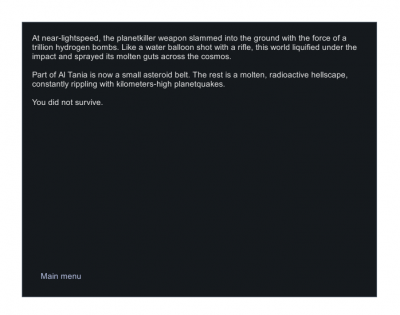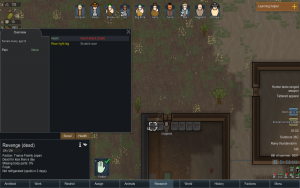Difference between revisions of "Events"
(→Transport pod crash (Ghoul): gray pall) |
m (→Problem causer: Sorry, forgot to label as minor edit) |
||
| Line 133: | Line 133: | ||
{{Royalty|Section=1}} | {{Royalty|Section=1}} | ||
{{main|Condition causer}} | {{main|Condition causer}} | ||
| − | A [[condition causer]] has appeared within 10 world tiles of your colony, creating a negative effect. It must be destroyed to stop the effect. Some conditions may be situationally | + | A [[condition causer]] has appeared within 10 world tiles of your colony, creating a negative effect. It must be destroyed to stop the effect. Some conditions may be situationally inconsequential, such as a psychic suppressor (male) when you only have females in the colony. |
== Extreme weather == | == Extreme weather == | ||
Revision as of 09:13, 15 May 2024
|
| This article is a stub. You can help RimWorld Wiki by expanding it. Reason: Ideology events. Recover lost content from major rewrite OR revert to prior to rewrite. |
Events are driven by the currently selected AI storyteller.
Most events that occur create a Letter, an envelope icon on the right side of the screen. Other events will pause the game and pop up a window where the player must make a choice. Usually, the color of the envelope will suggest the severity of the event; blue envelopes are good events, grey is neutral, yellow is bad, and red denotes direct threats.
Many event titles are variable. They can mention location, pawn and faction names, specific buffs or debuffs, or even have countdowns for the time variable events.
Major threats
Major threats can appear from Base Builder difficulty onwards. They mostly consist of direct attacks to your colony. Their size depends on the raid points mechanic; generally increasing in strength with wealth, colonist count, and difficulty.
Cassandra Classic and Phoebe Chillax both treat major threats separately from other events; they cycle between "OnDays" and "OffDays", where a certain amount of major events will occur during each OnDay cycle. Randy Random simply treats a major threat as an event that's less likely to happen.
Major threat generation
Major threats can be fired via 3 different methods: storyteller, quest, and special fired. Storyteller major threats are fired according to the Storyteller's schedule. Randy's "schedule" is a random firing mechanic. Quest major threats must be explicitly accepted by the player. Special fired major threats are limited to Wastepack Infestations that can spawn when a wastepack deteriorates (Biotech DLC).
For Storyteller fired major threats, first the storyteller determines which type of major threat is to be sent. Each type of major threat has a specific weight. Some major threats may not be possible at a specific time and would have a weight of 0. For example, Infestations and Mass Animal Insanity each require specific conditions that may not be met. Some major threats are gated behind Raid Point amounts. Infestations and Mechanoid Droner, Defoliator and Clusters all required at least 400 Raid Points.
Weights: Raid 7.40 DefoliatorShip 0.40 (2 with no DLC) DronerShip 0.40 (2 with no DLC) MechCluster 1.90 (0 with no DLC) Manhunter 2.00 MassInsanity 1.30 Infest 2.70 Wastepack Infest 0.0240 (0 with no DLC) Problem Causer 0.95 (0 with no DLC)
Raid Generation
After the storyteller has chosen to fire a major threat, and chosen to fire a raid, first the Faction of the Raid is chosen. Each faction is given a weight and all hostile factions are considered separately. Human factions each have a weight of 1. The mechanoid faction's weight changes with raid Points. As Raid Points go up the weight of the Mechanoid Faction Increases. Mechanoids weight is 0 until 300 raid points. The weight of human factions can become 0 at extreme temperatures.
After the faction is chosen, the attack type is chosen. Each attack type has a weight. Some factions do not have all possible attack types. For example, Tribals cannot Siege. After the attack type is chosen, arrival method is chosen. Each arrival method has a weight. Some weights change based on raid points. Some arrival methods are not possible with some factions. Some attack types only arrive via certain methods.
Once Rimworld has determined the faction, attack type and arrival type, a Raid Composition is selected. Each faction has defined raid compositions like the "all sniper" or "all melee attack".
Enemy attack
Commonly known as a raid, this event comes in several types. It is possible for multiple raids to happen at the same time, even of opposing factions. Raiders will come and assault your colony, first attacking adult colonists that they can walk to, then animals and buildings. Human raiders flee if enough of them have been downed or killed, or if enough damage to your colony has been done. Mechanoids will persist indefinitely.
Arrival methods
Tribal-level factions can't use drop pods, so are limited to assaults.
- Assaults: Arrive at the edge of the map, either by walking or by drop pod. They may assault the colony immediately, or stage for a time before launching their attack, giving you time to prepare.
- Center drop: Raiders immediately attack via drop pod, centered on one of your colonists. There is 40% to drop on an unroofed orbital trade beacon if one is present. Drop pods can go through constructed and thin rock roofs, but not overhead mountain.
- Scatter drop: Raiders immediately attack via drop pod, which have gone "haywire" and will disperse throughout the map.
Types
- Smart: "Unusually clever", will try and avoid traps and turrets.
- Sappers: Sappers will try and mine or break walls to create the shortest route to a colonist's bedroom. They are smaller than usual raids.
- Breachers: Appears with breach-type raiders, such as tribals with breach axes or termite mechanoids. Breachers will attack walls in their path indiscriminately, as opposed to sappers having a target.
- Siege: See below.
Siege
Sieges are a special type of raid. They arrive in drop pods, along with supplies. They will construct sandbags and mortars, and will continuously be supplied with food and mortar shells. They will fire at colonists, colony structures, and other pawns they are hostile to. Sieges will directly assault the colony after a long time (a few days), if their mortars are destroyed or unbuildable, or after sufficient casualties.
It is possible to steal a critical material (like components) and prevent them from completing construction. This is largely possible with a psycaster![]() using both Invisibility and Skip, with enough heat capacity to cast both 2-3 times in a row.
using both Invisibility and Skip, with enough heat capacity to cast both 2-3 times in a row.
Strategies to force sieges to attack include the sniper rifle (watch out for other snipers), a psychic animal pulser, or your own mortars.
Infestation
Infestations come with hives and insectoids. Hives will produce insect jelly, but will rapidly create insects, too. If you don't want it to infest the whole area, muster your forces and destroy it. But beware - the bugs will defend their hive.
In order for a regular infestation to spawn, there must be an open area with the overhead mountain roof, within 30 tiles of a colony structure, and a temperature above -17 °C (1.4 °F). Light, and temperatures below -8 °C (17.6 °F) reduce the chance of infestations.
The Too Deep: Infestation is a separate event. Insects can still arrive, but this event has separate mechanics.
Manhunter pack
A pack of scaria-infested animals have arrived, hunting for human flesh. A manhunter pack has 40% more points (i.e. 40% more "raiders") than a regular raid. When killed, scaria has a chance to instantly rot a corpse, which makes them inedible and creates rot stink. A single animal can arrive and the event will still be called a "pack".
Manhunters will roam the region, attacking any human they can path to. The animals can't enter doors, but if they see a colonist run behind a door, they will attempt to beat down the door. If left alive, they will congregate around your base for anywhere from 24 to 54 in-game hours before they all leave.
Psychic wave
Appears as Mad Animals: (Animal name). Immediately drives local wildlife insane, becoming manhunter. As opposed to a manhunter pack, these animals do not have scaria, and so won't immediately rot. No new animals are created - only animals already on the map can be affected. This fact means that psychic waves scale poorly with raid points; advanced colonies will find these events much smaller than any other major threat.
As manhunters, the selected animals will roam the region, attacking any human they can path to. The animals can't enter doors, but if they see a colonist run behind a door, they will attempt to beat down the door. Unlike with scaria, the manhunter status will end when the animals need to sleep.
This event has a variation that only affects a single animal, which is not considered a major threat.
Crashed ship part
A large piece of an ancient ship crashes nearby, along with a pack of mechanoids. The mechs will generate dormant, but will awaken when they or the ship part are attacked. While the ship part is still active, they will activate an intensifying negative effect on the map.
Defoliator ship
A crashed defoliator ship kills all wild or domesticated plants in an expanding circle, up to a radius of 100 tiles. The poison kills crops randomly, including plants grown in hydroponics basins. Crops will end up nearly impossible to grow.
Psychic ship
A ship part projects a psychic drone which negatively affects the mood of a specific gender. It begins low and grows progressively stronger the longer it stays. Psychic sensitivity increases or decreases the drone's effect.
The ship's is also capable of emitting psychic pulses that can drive a colonist to an immediate mental break, or nearby animals to madness.
Drone intensifies
If left alone long enough, the drone emitted from a crashed psychic ship will get worse as time goes on. Every 2.5 days the drone gets stronger, from -12 mood at the beginning up to -48 after 7.5 days.
Mech cluster
| This article relates to content added by Royalty (DLC). Please note that it will not be present without the DLC enabled. |
Mech clusters are similar to crashed ship parts with a more complex structure, with buildings like walls, turrets, and unstable power cells. They also spawn dormant, but can come with activators, able to wake up from proximity or over time. They can come with on-map condition causers, such as sun blockers or EMP dynamos.
Problem causer
| This article relates to content added by Royalty (DLC). Please note that it will not be present without the DLC enabled. |
A condition causer has appeared within 10 world tiles of your colony, creating a negative effect. It must be destroyed to stop the effect. Some conditions may be situationally inconsequential, such as a psychic suppressor (male) when you only have females in the colony.
Extreme weather
The following events can appear from Base Builder difficulty onwards.
Flashstorm
A localized, intense lightning storm within a radius between 45 and 60 tiles. Active lightning will strike between every 320 ticks (5.33 secs) to 800 ticks (13.33 secs). Once it finishes, no rain can fall until 30,000 ticks (8.33 mins) has passed. This can create big fires. It lasts between 0.075 and 0.1 days, and will not reoccur for 15 days. Clicking the envelope icon offers the option to jump to the center point.
This can also be caused by the Flashstorm Psycast ![]() , but will not show up as a notification.
, but will not show up as a notification.
Toxic fallout
"A distant chemical fire has released a plume of poison over this entire region that will slowly settle out of the atmosphere. It will last for anywhere from a few days to an entire season."
Toxic fallout is a dangerous event which causes toxic buildup to any pawn not under a roof. The fallout also gives a −5 moodlet for colonists when outside. It lasts between 2.5 and 10.5 days, will not occur before Day 60 of the colony, and will not reoccur for 90 days.
Toxic buildup from toxic fallout is proportional to both Toxic Resistance and the Toxic Environment Resistance of the pawn. Animals have 50% Toxic Resistance, so buildup increases at half the rate, but exposed animals will eventually die. When animals die with toxic buildup, there is a chance, scaling with severity, for their corpse to immediately rot.
By default, toxic buildup increases at a rate of 40% per day. For humans, a moderate buildup - 40% severity, or 24 hours left outside - is enough to potentially cause permanent damage, from either dementia or carcinoma. Death happens at 100% severity. In Biotech,![]() both resistances can be gained in a number of ways, allowing counters to the effects of the fallout. These include the face mask, gas mask, detoxifier kidney, detoxifier lung and several genes.
both resistances can be gained in a number of ways, allowing counters to the effects of the fallout. These include the face mask, gas mask, detoxifier kidney, detoxifier lung and several genes.
All plants, including trees, will wither during the fallout.[How long?] Crops can be protected under a roof, but without a sun lamp, they'll rot anyways. Insectoids and mechanoids are fully immune.
Volcanic winter
"A distant supervolcano has erupted and begun spewing millions of cubic kilometers of ash into the atmosphere. Ash in the atmosphere will obscure the sun. Temperatures will drop and plants will suffer for lack of sunlight. It could pass in a few weeks, or it might last many months."
Volcanic winter lowers the temperature and natural light, which in turn weakens solar generators and slows plant growth. They also appear to significantly reduce the inflow of wildlife (observed in a Temperate Forest, 300x300, very few animals came in during Spring-Summer when there would normally be many). This can easily lead to meat shortage and famine if you do not have sufficiently large farms for your colony. Volcanic winters will last between 7.5 and 40 days, will not occur before Day 60 of the colony, and will not reoccur for 140 days.
Random
Quests
Quests are a class of event that provide conditions to be met or actions to be performed to gain a reward. There are a wide variety of quests, which are listed on the quest page.
Good
Ambrosia sprout
A grove of the mysterious ambrosia bush has sprouted nearby! If you wait for the plants to grow, you'll be able to harvest the delicious, pleasurable, and slightly addictive fruit.
Ambrosia bushes are the only way to harvest ambrosia, a safe mood boosting social drug. A good way to harvest them is to draw a growing zone over them, but forbid sowing. Colonists will then automatically harvest the bushes when they are fully grown.
It can only happen in the following biomes:
Animals join
Tamed dogs or farm animals from off-map join your colony.
Animal self-tamed
A random animal on the map becomes tame, and immediately joins the colony. The frequency of self-taming events is unrelated to the number of animals on the map, provided there is at least one. This means in a tundra biome with one snowhare you're just as likely to get a self-taming event as in a tropical swamp populated with dozens of animals. Previously tamed animals can self-tame, and will retain the name and all training they previously had.
For pen animals, you must rope them into a pen or to a caravan hitching spot or the animal will eventually run off the map, though usually this is not urgent. For zoneable animals, you should check the "Animals" tab and assign the animal to an appropriate zone, unless you want to let it move unrestricted. If you are dangerously low on food, be aware that if a zoneable animal self-tames and there is no food in the environment, it will run inside your base and eat your food stores when it gets hungry.
Aurora
An aurora lights up the night sky, giving a +14 mood boost to anyone who is outside watching. While in real life it only happens near the poles, on the rimworlds it can happen anywhere regardless of latitude. It ends at day and otherwise lasts from 0.125 to 0.35 days.
Despite the event text stating that it will "make the night brighter", it does not actually affect the light level.
Cargo pods
From time to time, cargo pods will fall out of orbit, containing a random amount of single type of resource. The remains of the pods become steel slag chunks, which can be refined into usable metal at an electric smelter. The pods have a chance of crashing through the roofs of any buildings, damaging any nearby furniture, structures or any pawn they land on.
Herd migration: (Animal)
A large herd of animals is passing through the area. They won't attack unless provoked. They pass by quickly, so you must be quick if you want to hunt or attempt taming them.
This event only occurs in the following biomes:
Party
One of your colonists will throw a party around a party spot, or if unavailable, a gather spot (table or campfire). Colonists will continually get mood buffs the longer they attend a party.[Detail] Each stack adds +0.8 to mood, lasts 10 days and stacks up to 10 times, for a max buff of +8 mood. In addition, a party provides many social opportunities. They will usually have beers and smokeleaf joints, if available, and eat meals even when not hungry.
Pawns that don't attend won't get mood buffs. Players may have to draft and undraft pawns to get them out of work. If too many pawns are drafted at once, or if a raid happens, then the party will be called off.
Psychic soothe
When this event triggers, the soothe gives a positive mood modifier (+16 for normal colonists, more or less depending on the Psychic Sensitivity) to all colonists of a randomly chosen sex. It can be considered the opposite of the Psychic Drone, but does not have different levels of severity. It lasts between 1.5 and 3.0 days and will not reoccur for 15 days.
(Trader type)
This event, without a faction mentioned, occurs when an orbital trade ship passes near the colony and you have a powered comms console. Players may trade to obtain resources or weapons, or alternatively sell excess items for silver, which is always accepted by traders. Note that orbital trade ships can appear even when the comms console is turned off, so check the console during a solar flare.
You need to build orbital trade beacons before contacting them so you can beam silver and items up to the ship to actually carry out transactions. You can still check the items for sale even without them however.
(Trader type) from (Faction)
This event with the faction name mentioned means the traders are terrestrial. Trader caravans from other non-hostile factions can stop by your colony, whether specifically requested via the comms console at a hit to good will or randomly on their own with no penalty.
Transport pod crash
A downed and injured occupant falls from the sky, containing members of a faction or neutral, unaffiliated spacers. A friendly or neutral occupant can be rescued to a medical bed, while a hostile member must be put into a prison bed.
Once healed, non-hostile crash victims will either join your colony out of gratitude, or walk away to return to their faction. You can instead capture a non-hostile person, but their faction (if not spacer) will turn hostile.
Paralytic abasia
| This section relates to content added by Royalty (DLC). Please note that it will not be present without the DLC enabled. |
A transport pod can crash with a person with paralytic abasia, a disease which prevents movement until cured (usually after 40 days). Unlike regular transport pods, the person will directly ask to join the colony. If you refuse, then colonists will get the same penalties as if you banished another colonist.
Baby
| This section relates to content added by Biotech (DLC). Please note that it will not be present without the DLC enabled. |
A transport pod may crash with a baby instead of the regular occupant, and will always appear as a friendly faction/neutral refugee/unaffiliated. You can choose to ignore it and let it starve to death, or adopt the baby by selecting it and click "Adopt". Rarely, the corpse of the baby's parent can also appear next to it, still in pristine condition.
Wanderer joins
A random person will forcefully try and join the colony. You have 24 hours to accept or reject them. Accepting will have them appear on the world map. Rejecting will give the same penalties as if you had banished a colonist. Unless it'd be dangerous to enter your colony, there is no reason not to accept the wanderer, see their stats, and then decide to keep or banish them.
With Ideology![]() , the colonist that joins the colony will have a randomized Ideoligion. This event can also occur at 50% rate if an Ideoligion's event result set for this event is "Beautiful/Fun/Good / Unforgettable", with said colonist with the same Ideoligion as the masses of the colonist in the colony.
, the colonist that joins the colony will have a randomized Ideoligion. This event can also occur at 50% rate if an Ideoligion's event result set for this event is "Beautiful/Fun/Good / Unforgettable", with said colonist with the same Ideoligion as the masses of the colonist in the colony.
Wild (wo)man wanders in
A random person with no faction wanders into your colony and will mill about the map. You have the option to Tame this person with a minimum Animals skill of 7. Doing so will convert them to into a completely normal colonist. Sometimes, they may not be able to resist the harshness of nature and may fall unconscious (ex: Toxic Fallout, extreme temperatures), allowing you to rescue them like transport pod crash victims. They also have the same hunger needs as regular humans, and if they do not find animals to hunt or wild plants (or simply do not want to) they can walk into your base and eat your food, which can be an annoyance. Arresting them will not allow you to recruit or enslave![]() them like regular prisoners, they must be tamed or rescued.
them like regular prisoners, they must be tamed or rescued.
Wild humans have a 50% chance of attacking when harmed, and 10% if taming fails.
These wild (wo)men may have random Ideoligion with Ideology.
Unlike other animals, wild people will not flee from gunfire. Cannibal wild people can hunt human pawns for food like a predator. It is unclear if this applies to non-cannibals as well.[Detail needed]
Traveler Visit
Occasionally, one or more members of a friendly faction will arrive, just passing through. They'll enter at one edge of the map and proceed across the map. They'll exit the map upon reaching another edge.
A drafted colonist can be directed to capture (arrest) one of the travelers. However, once the arresting colonist reaches the target, that entire faction will immediately turn extremely hostile, dropping to -76 Goodwill. This shift includes any other members of the same Faction currently there.
Visitor(s)
Friendly faction members may stop by your settlement. Occasionally, they will have a few goods to trade. Like a regular trader they will mill about the player's colony for a while. Unlike a regular trader, they don't have many goods with them, nor do they have as much silver to buy your goods. Visitors possess no higher purpose otherwise, but will fight mutual enemies.
Sometimes there will be a singular visitor. In this case, the game will notify you of the backstory of that visitor.
Royal Tribute Collector
| This section relates to content added by Royalty (DLC). Please note that it will not be present without the DLC enabled. |
If you are not hostile to the Empire, Royal Tribute Collectors will visit the colony approximately twice a year. Tribute collectors are essentially Empire-only trade caravans that exclusively accept gold and prisoners in exchange for Honor.
Gauranlen pod sprout
| This section relates to content added by Ideology (DLC). Please note that it will not be present without the DLC enabled. |
A Gauranlen pod has sprouted nearby! Harvest it to collect a Gauranlen seed. This special seed can be used to plant the majestic Gauranlen tree. Your colonist can connect with Guaranlen trees and make them spawn resources and helpful dryads to work or fight for you.
A pod will appear somewhere with the current map. Harvesting it yield 1-2 Gauranlen seed. This event occurs roughly every 60 days in every biome except Ice Sheets and Sea Ice, and this time is decreased to roughly every 30 days for tree connectors. This event can also occur if an Ideoligion's ritual result is set to trigger this event and performing the ritual receives a "Beautiful/Fun/Good/Unforgettable" quality.
Polux tree sprout
| This section relates to content added by Biotech (DLC). Please note that it will not be present without the DLC enabled. |
A polux tree may appear whenever there is enough pollution around. It will consume and clean up said pollution, but will not do so if it or its roots are under a roof.
Bad
Beavers!
A group of ravenous tree-munching alphabeavers appears at the edge of the map. This only occurs in the arid shrubland and tundra, and only when the outdoor temperature is above the alphabeaver's minimum comfortable temperature of -40 °C (-40 °F). It will not reoccur for 30 days.
Beavers will act like any other animal. But due to their unique diet and extreme hunger, beavers will continually eat trees and Saguaro cacti they can reach, including anima trees![]() , gauranlen trees
, gauranlen trees![]() , polux trees
, polux trees![]() and any trees you're farming. Alphabeavers will not and cannot eat the
and any trees you're farming. Alphabeavers will not and cannot eat the ![]() wood item, wooden buildings, or any other item made out of wood.
wood item, wooden buildings, or any other item made out of wood.
The beavers will continue eating until there are no trees left, unless you eradicate them or they're driven off the map by temperature.
Birthday
Character gains an age-related illness, such as bad back or cataracts. They may be cured by using the healer mech serum, luciferium, a biosculpter pod![]() , or the Scarless gene
, or the Scarless gene![]() . Some may be 'cured' by replacing the affected parts with bionics.
. Some may be 'cured' by replacing the affected parts with bionics.
Due to age or a pre-existing health condition, they can also have a heart attack.
Blight
Blight is a disease that infects domesticated plants with a growing period shorter than 15 days. Blighted crops will not grow or yield anything when harvested, and the blight will spread to other nearby plants within 3 tiles. These plants must be cut in order to avoid further spread. Trees, wild, decorative plants, and devilstrand mushrooms are immune to blight.
Blight starts on one of your crops, at 10% severity, affecting 20% of your plants (40% initial plants affected has been witnessed in December 2020). It will progress slowly once plants are infected, and once it reaches 28% it can spread to nearby plants within a 4-tile radius.
It will not reoccur for 30 days.
Disease
Colonists (including prisoners and slaves![]() ) or animals will gain a random disease. Biome influences both the amount of disease and its selection. Multiple pawns can get a disease at once, but diseases never spread between pawns. Disease events are controlled separately from other events by your storyteller.
) or animals will gain a random disease. Biome influences both the amount of disease and its selection. Multiple pawns can get a disease at once, but diseases never spread between pawns. Disease events are controlled separately from other events by your storyteller.
Sickly pawns will get sick with a MTB of 30 days, independently of the rest of your colonists.
Eclipse
A moon has moved in front of the sun, causing an eclipse. Without light, solar generators won't function, and outdoor crops stop growing. It lasts between 0.75 and 1.25 days.
If reliant on solar power, make sure to have batteries for times like these, or an eclipse raid can be extra threatening.
Pawns with the Eclipse: Beautiful precept![]() will receive a +5 moodlet for seeing an eclipse.
will receive a +5 moodlet for seeing an eclipse.
Heat wave
| This section is a stub. You can help RimWorld Wiki by expanding it. Reason: Needs details. How much is the temperature raised by? What's the chance for a fire to occur?. |
A heat wave sweeps the colony, driving outdoor temperatures unusually high for 1.5 and 3.5 days. There is also a chance for a fire to randomly appear on the map, which can quickly spread. It only occurs when the map's summer temperature is at least 20 °C (68 °F), and will not reoccur for 30 days.
The major risks are coolers failing to freeze food, and heat stroke to your colonists and animals. Summer clothing like cowboy hats and tribalwear can mitigate the heat, and passive coolers can help make indoor temperatures bearable.
Cold snap
| This section is a stub. You can help RimWorld Wiki by expanding it. Reason: Reverted from before the rewrite with minimal changes. All information should be re-verified given its age. Also should be rewritten to better match heat wave above. |
A cold snap makes the temperature of a colony drop. It only occurs when the map's summer temperature is in the range of 0 °C – 15 °C (32 °F – 59 °F). Colonists will complain about the cold, especially sleeping in it if their rooms are not properly heated.
While this is generally good for item preservation, it can kill off crops, influence colonist moods and cause hypothermia if colonists or animals stay in non-heated areas for a prolonged time. It also renders most of the plants in the area inedible (unless when it happens in warmer areas in which some plants are still edible), potentially causing tame animals to starve to death and wild ones to leave the map. With no other food source, wild predators may attack colonists and tame animals while they are outdoors. Snowing may also happen, depositing thick snow that can slow down outdoor movement significantly.
Jackets, dusters, parkas and tuques provide cold insulation for colonists, protecting them while they're awake, though they don't prevent mood loss caused by sleeping in cold areas.
It lasts between 1.5 and 3.5 days and will not reoccur for 30 days.
Mad animal
A single random animal on the map turns manhunter, like a psychic wave. The insane animal will charge toward the nearest human anywhere on the map, attacking any other animal or obstacle (doors, fences, barricades, etc.) blocking its way. If the "nearest" colonist changes, the animal may change its focus to that target.
Any animal can be dangerous to a colonist, but multiple colonists can usually take them out. Large animals, as well as the explosive boomalope and boomrat, are bigger threats.
Psychic drone
'Drone' in this case does not refer to "Unmanned Aerial Vehicle" but instead "To produce a low-pitched hum or buzz." A psychic drone affects all colonists of a randomly chosen gender, giving a strong negative moodlet. The drone can vary in severity, from low (-12 mood) to extreme (-40 mood). Psychic Sensitivity will multiply the effect on the drone. It lasts between 0.75 and 1.75 days and will not reoccur for 15 days.
Colonists have no choice but to endure it, as the point of origin is off-map. Psychic foil helmets, drugs, and other mood-enhancers can help deal with the effects. Animals are not affected.
Solar flare
Solar flares cause all electrical devices to stop working for its duration, from 0.15 to 0.5 days. Wood-fired generators and chemfuel generators will still burn fuel during this time.
- Colonies that rely on turrets for defense will become vulnerable to raids.
- Heaters and coolers will stop working. In extreme temperatures, crops will die and colonists can be at risk of heatstroke or hypothermia. Campfires and passive coolers are low-tech options that work even in a solar flare.
- Crops in a hydroponics basin will rapidly degrade, regardless of the temperature. It's recommended to quickly harvest any crops that can't be saved before they die.
- Occasionally an orbital trade ship may arrive during the event, so it is wise to check out the Comms Console as soon as the event ends or risk getting the ''<trader> has left comms range" notification while unaware of their presence. If a ship leaves during a solar flare, you will be notified that the trader has left, although this is only a minor message in the upper right of the screen.
- The colony is immune to the effects of a solar flare while also undergoing unnatural darkness
 [Verify]
[Verify]
Due to its length, most of the adverse effects are manageable.
Zzztt...
| This section is a stub. You can help RimWorld Wiki by expanding it. Reason: Exactly what options zzzt in the rain. |
This event can occur anytime a power conduit has energy flowing through it. The conduit may suffer a fault, causing a short circuit. They may also occur if certain objects are left unroofed and are exposed to rain or snow. Short-circuits not caused by rain/snow will not reoccur for 8 days. Short circuits do not affect hidden conduits, meaning zzztts can be avoided entirely by simply having all applicable buildings under roofs and having a network made entirely of hidden conduits.
The following buildings short circuit due to weather:
- Sun lamp
- Tube television
- Flatscreen television
- Megascreen television
- Comms console
- Multi-analyzer
- Vitals monitor
- Battery
- Electric tailor bench
- Electric smithy
- Machining table
- Electric stove
- Electric smelter
- Biofuel refinery
- Fabrication bench
- Hi-tech research bench
- Electric crematorium
- Heater
- Lightball

- Loudspeaker

- Autobong

Short circuits will either result in a fire, or, if any batteries are connected to the circuit and contains at least 20Wd, a fiery explosion centered on the tile, that increases with energy stored. The explosion deals 10 Flame damage and setting objects on fire. If the explosion radius is greater than 3.5 tiles, a second explosion of 30% radius deals 50 Bomb damage, which can extinguish fires. The fault will also discharge all stored power in batteries in the process.
The explosion radius is controlled by the following equation:
| Explosion Radius = clamp( sqrt(Sum of all stored power) * 0.05, 1.5, 14.9) |
Or in other words, the radius will be at least 1.5 tiles, and at most 14.9 tiles, with a bomb explosion of 4.5 tiles. This occurs when a total of 90,000 Wd is stored. Bomb explosions can occur beyond once 4,900 Wd are stored.
| Explosion radii per number of batteries filled |
|---|
Unconnected batteries, such as through an open switch or on separate power network, will not be affected. Power networks which contain only batteries and no conduits will not experience this event. Power networks which contain only conduits will only have a single tile on fire, as there's no stored power to be discharged.
Transport pod crash (Ghoul)
| This section relates to content added by Anomaly (DLC). Please note that it will not be present without the DLC enabled. |
A transport pod may crash with a ghoul instead of the regular occupant, and will always appear as unaffiliated. They will always appear as hostile and will initially be in shock, but if left ignored, will immediately attempt to attack anything or anyone nearby after a while.
Gray pall
| This section relates to content added by Anomaly (DLC). Please note that it will not be present without the DLC enabled. |
A fog of eerie, gritty dust settles on the map. Colonists standing in an unroofed area will receive a −6 gray pall exposure moodlet, while colonists under a roof will have −3 gray pall. The pall is otherwise not dangerous and disappears after 1-2 days.
Incidental
These events aren't triggered by the storyteller. Instead, they come from various other game mechanics.
Good
Friendlies
This event can only occur if you are allied with at least one other faction and have enemies on screen. Allied factions may send around fighters to assist you when mutual enemies appear, such as pirates, manhunters or insectoids. They won't assist against factions that they aren't hostile to. Keep in mind that friendly fire will damage your relations with the aiding faction. On the other hand, rescuing their downed people will improve relations.
There are two versions of the friendlies event. The first is sent by an allied faction at 0 cost. These friendlies are raiders who are allied with you. They can arrive via any method and use the usual raid points system to determine their size.
The second can be called in instantly via comms console, at the cost of -25 goodwill. The faction must be allied with you, and have an Industrial tech level or higher. These allies will always arrive through drop pod, and can use any arrival method with drop pods. Unlike the random event, these friendlies are set with a strength between 150 - 400 raid points, instead of using the raid points of your colony.
Masterwork
One of your colonists has produced an object of masterwork quality.
Legendary work
One of your colonists has produced an object of legendary quality.
Man in Black
When your colonists are no longer able to defend themselves, a stranger may join the colony to help. As their name indicates, men in black come in a full set of black clothing. They also come wearing a flak vest and always carry a revolver. Their skills and traits are fully randomized, but they will always be capable of Violence and Caring, and their favorite color![]() will always be black.
will always be black.
This event is triggered only when all of your colonists are downed at your base, but almost always happens when this is the case. This event can only happen if your colony has ever had at least 3 colonists, which prevents it from appearing in solo colonist starts. This event also has a cooldown of roughly 1 year. [Verify]
The man in black will not appear on the temporary maps generated for world quests. However, if all your surviving pawns are downed elsewhere, it is possible for the man in black to appear at your base. (Testing is needed to see how these events are affected by allowing multiple colonies in the scenario editor.)
| Pawn Type | Image | Combat Power | Gear Health (%) | Avg. Gear Quality | Clothing Budget | Weapon Budget | Available Weapons | Age Range | Additional Info [edit]
|
|---|---|---|---|---|---|---|---|---|---|
| Man in Black |  |
55 | 100 | Good | - | 500-500 | Revolver | 20-55 | Always has a black pants, button-down shirt, flak vest, duster, and cowboy hat. Always carrying 10 nutrition worth of food.[Verify] and 5 medicine.[Verify] Always has Shooting skill between 8 and 16. Is never incapable of Violence or Caring. 5% chance of spawning addicted to a drug. |
New recruit
You'll get this notification whenever a Warden has succeeded in recruiting a prisoner. It also appears if a transport pod crash victim chooses to join your faction.
Meteorite
A large meteorite has struck ground in the area. It has left behind a lump of [material]. During daylight, a large shadow will project on the ground which shrinks as it closes in.
The meteorite will severely damage or kill anything that is below it. Any colonists beneath the meteorite has a small while to escape before they are crushed by it. The map tile will read: Meteorite (incoming).
Outpost destroyed
This is the notification that triggers when you successfully defeat all humanlike hostiles in an enemy base after invading them (not counting turrets, which need to be neutralized separately). After this you have a while to capture any prisoners (there is usually at least one building suitable to turn into a cell), treat the wounded, pack up and leave before enemy reinforcements arrive in the form of a raid.
Faction defeated
Should you destroy all bases of a faction, the notification will say that since you just destroyed the last faction base, the faction no longer exists.
You can still view the defeated faction in the menu, and it will show 'Defeated' below it. They won't send any raids, nor will they send caravans. It should be noted that this does not actually decrease the total frequency of raids you will get, as whether a raid happens or not is determined separately and before a faction is chosen. It just means that the raids will not be from this faction and will be from other factions, and with fewer human factions to choose from the game will start sending more mechanoid raids, which can inadvertently make the game harder if you find mechanoids more difficult.
Destroying and/or befriending all factions will make mechanoids the only remaining threat for all future raids.
Ransom (Time remaining)
This event can only occur if a colonist of yours was captured by another faction.
Another faction captured one of your downed colonists somehow and will release that colonist to you... for a price. Common methods for capturing your colonists include grabbing downed colonists while retreating from a raid or downing an entire caravan.
The offer will be good for 24 game hours. If paid, the colonist will immediately appear on your map border or be sent via drop pod.
Rare thrumbos
Two to six thrumbos will spawn at the edge of the map, staying around for a while to eat anything they can, including your crops, but not including anima trees![]() . The player can attempt to hunt or tame them, both of which are very difficult. If no action is taken, they will leave on their own after a few days. It will not reoccur for 13 days.
. The player can attempt to hunt or tame them, both of which are very difficult. If no action is taken, they will leave on their own after a few days. It will not reoccur for 13 days.
Reactor ready
You have completed the 15 day warm up period for starting a ship reactor. If the rest of the necessary ship parts have been built, it may now be launched. Raids and sieges will drop considerably after this period is over.
Ship chunks
This event doesn't have an envelope, but rather appears in the notification bar up top, assuming these chunks don't strike your colony or pawns. One or more ship chunks fall onto the map. They can be deconstructed for 5-6 components and 20 steel. Rarely they can punch through roofs, damaging structures near it. Extremely rarely, they can land right on top of a colonist, killing them.
In Beta 18 the ship chunk creates an explosion upon landing. The falling chunks cast shadows on the ground, giving a little time for colonists to move out of the way.
Trauma savant
This event only has a 12% chance to trigger upon one of your colonists receiving a brain injury.
A colonist has suffered a brain injury and has gained great abilities from it at the cost of others, gaining 50% extra manipulation while losing the ability to speak, hear, and have any social relationships. It also restores the brain to full functioning, despite the injury.
Quest completed
You've done what was requested by other factions and will receive the reward at your nearest(?) base via pods very close to your buildings, along with an improvement in relations. While they attempt not to, the pods may also crash through your roof, so be prepared to repair them.
Anima tree sprout
| This section relates to content added by Royalty (DLC). Please note that it will not be present without the DLC enabled. |
If an anima tree was killed by any means, this event can occur within a few days from the last death of the tree, appearing at random places that are unaffected by its radius.
Bad
Ancient danger
As (Colonist name) draws near the ancient wall a sense of foreboding overcomes him(her). (S)He isn't sure why, but (s)he feels this dusty structure may contain great dangers
— Message that appears when the first colonist walks near.
This event is related to map generation and may not appear on every map. It may occur more than once per map. While listed as a danger, they are usually harmless until disturbed.
A colonist approached a walled out area of the map partially or completely under a mountain. It contains one or more of the following: ancient cryptosleep caskets, bugs with hives, mechanoids or treasure. Open at your own risk, by blowing a hole or deconstructing a section of the wall.
First, you'll need to deal with hostiles outside. Then, opening or attacking any casket will cause all the others to open instantly. The cryptosleep caskets usually contain humans, but may also contain megascarabs or be empty. The Spacers inside the caskets may or may not be dead. If alive, they may or may not be wounded, or armed and hostile. It's even possible for pawns incapable of violence to melee attack. If they are not hostile and can walk, they will try to escape. Any alive Spacers inside may be captured and recruited, usually with a low recruitment difficulty percentage.
Ancient structures may include other treasures like psychic lances and pulsers. Luciferium can be found in these buildings. Pod people sometimes carry plasteel, components, and gold. The caskets can be claimed and used or deconstructed by the colony.
Animal revenge
An animal that was harmed will go mad and become manhunter. When you select an animal to be hunted, the game will notify you if it has a chance for revenge and what the percentage is. Occasionally, all nearby pack members of that animal's species may start attacking their attacker.
Death
One of your pawns has died unintentionally. Slaughtering an animal or euthanizing a colonist or prisoner will not produce this event.
Drug addiction
A colonist has taken too much of a drug and is now addicted. They will now need to regularly take that drug or suffer the withdrawal effects. See here for advice on fighting addictions.
Heart attack
A character or tamed animal suffers a heart attack. Characters will seek out a medical bed or their assigned bed for treatment. Animals will return to the nearest empty animal bed or sleeping spot. Doctors will then proceed to attempt to resuscitate the victim, using medicine if allowed and available.
During a heart attack, people or animals can fall unconscious or even die if not treated in time.
Mental Break
One of your colonists or prisoners has had it and has a mental break. During this time, the afflicted colonist will be effectively unavailable, will not do colony work and can not be drafted. They will use forbidden doors and items. They will also attend to their needs such as sleep, recreation, and eating.
Depending on the nature of the mental break, there are several ways to handle the situation:
- Wall the person in – this is only possible if they wander to a suitable location.
- Try to arrest them. They will possibly resist and need to be beaten down, causing injury. This will also give them a fairly long-lasting mood debuff ("I was arrested!") after you release them from jail. Arresting temporary members will immediately cause their faction to become hostile.
- Wait out the situation - This takes a while for most minor breaks.
Overdose
One of your colonists or animals has overdosed. There is a risk of overdose when taking any hard drug, as well as when taking too many non-social drugs in general. This can cause permanent damage or even death.
Predator hunting
A wild, hungry predator has targeted one of your colonists or tamed animals for killing and eating. This will only be triggered if a hungry predator is on the map. This means if there are few wild animals near it, or if it's dangerously close to your base or pen, in some cases it can be a good idea to put out food to feed the predator so this event does not trigger. A hunting predator is different from normal enemies in a couple of ways. While regular enemies will tend to avoid targeting noncombatant children, predators will target them the same as a regular pawn. Predators will also not stop attacking once a pawn is downed, and will keep attacking until the pawn is dead and then eat the corpse. Predators don't change targets, even if a different pawn is closer, unless the targeted pawn becomes inaccessible, such as by entering the door to your base. As of version 1.4, colonists and turrets will not automatically identify predators hunting a pawn as hostile. Attacking the predator will trigger "animal revenge," which gives the predator the ability to change targets and all colonists and turrets will recognize it as a hostile. Version 1.5 patches this and they will be immediately identified as hostile by all colonists and turrets once they start hunting a pawn.
Prison break
| This section is suggested to be moved. Destination: Prisoners. Reason: Double up - See Talk:Events#Prison break is doubled up for discussion. |
Prisoners have staged a breakout! They are able to open doors and attempt to seek weapons, fight, or try to escape. Prisoners are more likely to attempt breakout when they are healthy, have aggressive genes![]() , or the room has more doors. As each prisoner has their own independent breakout chance, more prisoners will increase the frequency of an attempt happening despite not directly affecting each individual prisoner's mean time between prison breaks.
, or the room has more doors. As each prisoner has their own independent breakout chance, more prisoners will increase the frequency of an attempt happening despite not directly affecting each individual prisoner's mean time between prison breaks.
All rooms within 20 tiles of the prisoner who started the prison break have a chance to join it. The original room has a 100% chance to join. Other rooms have a 50% chance to join. If the room does join, all prisoners in that room are affected too.
Using low damage weapons is advised when containing a prison break to avoid a risk of killing them. Since prisoners are technically part of an enemy faction, any friendlies on the map will engage them. This is helpful if you need to contain a larger break, though the use of higher-powered weapons means they have a higher chance of outright killing the prisoner. Recapturing escaped prisoners from factions that have turned friendly since that prisoner was originally captured will not affect relations with that faction.
Roof collapsed
This event only happens if something is crushed by the falling roof. Otherwise, it's only a notification.
All roofs must be supported by a constructed or rock wall within 6 spaces with contiguous roof sections in between itself and that wall. If either of these conditions changes such as via mining, an explosion or demolition, then the roof will collapse. Damage is dealt to the head and shoulders. Note that falling roofs underneath a mountain will instantly kill any pawn unfortunate enough to be crushed.
If demolishing a building, it's recommended to use the Remove Roof tool to remove the roof first before deconstructing the walls.
Too Deep: Infestation
Insectoid infestations can spawn when actively digging from a deep drill. Insectoids, but not hives, will pop out around the drill's area. These do not have the overhead mountain requirement like regular infestations. However, they are often smaller in number, and are unable to reproduce due to the lack of hive.
Faction
Allied: (Faction)
Relations with another faction have risen above +75 and you are now allied with them. They may now assist you against mutual enemies.
Enemy now neutral: (Faction)
This notification will appear once relations have been improved with a Hostile faction enough that they will no longer be hostile. Common ways to improve relations include releasing prisoners from their faction (which must leave the map safely to receive the bonus), having successful peace talks or providing gifts.
Hostile faction
You've done something to anger another faction bad enough that they are now hostile to yours. This can happen if you arrest a faction member of theirs, rob one of their caravans or if they take too much friendly fire from your colonists, among other reasons. Rough factions that are neutral/allied will naturally decay goodwill, until they become hostile again.
Leader died
Occasionally, the leader of another faction will die, sometimes through no action on your part. The popup window will also announce his or her successor.
This alert uses the variable title of the leader in question. For example, if the "boss" of a pirate band dies you will see 'Boss died', if the "chief" died, then it will read 'Chief died', and so on.
This will also happen if the leader personally comes to raid your base and is killed in action. Killing an enemy faction leader will give a mood buff for a while to the colonist that accomplished this.
New Leader
Similar to the Leader Died event, except this one occurs only when you've succeeded in both capturing and recruiting another faction's leader. The leader then places first at the colonist bar, instead of last.
Informational
These events serve purely to give information about the game, and have no physical gameplay implications.
About: Electricity
Appears when you finish researching Electricity. Reminds you of the power of electric appliances, and the power infrastructure required to maintain them.
About: Getting advanced components
Appears when you finish researching Fabrication. Reminds you that you need advanced components to build a fabrication bench, and the potential means of obtaining them.
About: Launching the ship
Appears when you finish researching Starflight Basics. This is a simple reminder about the dangers of powering up the ship reactor once built. Once turned on, the number of raids will greatly increase for the next 15 days.
Persona Core Offer
A non-hostile faction will notify you that they know where an Persona core is located: a critical component for building a ship. They will want 1500 silver for this information. However, you can only make this request at the comms console with factions which have at least +40 goodwill.
You can always request for a persona core location with 100% success, even if this event doesn't trigger, so long as you have the requisite goodwill. It only serves to remind the player that it is possible.
Summer
This event occurs at the beginning of the summer quadrum, if you are lacking suitable apparel for winter's temperatures. It merely informs you that you are ill-prepared for the winter. Grow some more food and get some warm clothing. Plan ahead for any additions to your colony during these seasons, including recruits and born animals.
Unwaveringly loyal
Appears when you first capture an unwaveringly loyal prisoner. They are unable to be recruited as a colonist or be converted![]() , but can be released, enslaved
, but can be released, enslaved![]() , or used for a variety of human resources.
, or used for a variety of human resources.
About: Anima tree linking
| This section relates to content added by Royalty (DLC). Please note that it will not be present without the DLC enabled. |
Appears when an anima tree has 20 anima grass around it. Reminds you that a colonist with Natural meditation can begin the linking ritual, gaining a level of psycasting in the process.
Baby Prep
| This section relates to content added by Biotech (DLC). Please note that it will not be present without the DLC enabled. |
Appears when a human's pregnancy is at its third trimester. Labor will happen without warning within the next 6 days, so prepare a clean hospital with a good doctor.
Social
New lovers
You receive the announcement that two characters have become lovers, and "now want to sleep together". These are usually colonists, but a pair of prisoners can also become lovers. They will receive mood boosts or debuff proportional to their opinion of their partner, with +/- 1 mood for every 10 opinion above/below zero.
Starting the moment their new relationship is announced, couples will immediately have a -4 mood debuff for "sleeping alone", even if they won't get their first chance to sleep together for hours. This can be remedied by assigning both pawns to a two person bed, such as the double sleeping spot, double bedroll, double bed or royal bed. A double bedroll is preferred when in a caravan. Couples that sleep in the same bed can also perform Lovin' for a mood boost to both partners.
Breakup
A couple splits, complete with the Mood and Social penalties for both colonists. The one initiating the break-up is better off than the other in the couple.
Rejected proposal
After two characters fall in love, one of them proposed marriage but is turned down, which may result in the couple breaking up. The proposing one suffers a mood penalty of -18 for 25 days. They may accept another offer in the future. Note that a later, accepted proposal will not remove the mood effects of the previous, rejected ones.
Marriage is on!
A couple that has been together for a while will announce their engagement. The wedding will take place some time in the future, at a marriage spot, or any gathering spot (table or campfire) in lieu of one. Both fiancees and married pawns, like lovers, will want to sleep in the same bed. They receive mood boosts or debuffs depending on the relationship with their couple. They can also receive a mood boost from lovin'.
When the day of the wedding arrives, it will take place regardless of the entire colony's attendance. Pawns will sometimes take the family name of their partner upon marriage. After the ceremony takes place, a reception will follow with everyone drinking, smoking and eating if hungry. Getting married, as well as taking part in the marriage ceremony, gives a substantial, fairly long-lasting +40 mood buff to the newly weds, and +20 to attendees.
Colonists who do not reach the meeting point on time, such as those sleeping, fighting fires or lying incapacitated in bed, will not gain the mood buff from the event. A quick "draft" and "undraft" for everybody but the couple should be enough to coerce all capable colonists to attend. Colonists on caravans will not attend.
If the couple happens to be busy at the exact moment the wedding is to take place, for example, because they are drafted or loading a caravan, those who are not members of the trade group will remain waiting at attendance and perform no task at all, except for eating until the couple comes back.
Affair
Somebody who is already married starts an affair with a single person. It is possible for your colonists to cheat on their lovers who aren't members of your faction.
Divorce
A married couple has divorced; as a normal break up, but with worse mood penalties.
World incidents
Attack begun
This notification will appear when a caravan has arrived at a settlement chosen for attacking.
Bandit camp opportunity
Some ruffians are causing trouble nearby and other factions will pay you to wipe them out.
The bandit camp will time out and are weaker than regular enemy bases.
Destroying them increases goodwill by 8 and returns a payment worth 2000 to 3000 worth of silver, whether it consists of items or silver itself.
Caravan ambushed / (manhunters)
While traveling, one of your caravans are attacked. The game will give you a mini map to defend it.
The attackers can be an enemy faction lying in ambush or a rampaging manhunter pack your caravan unfortunately trespasses upon.
Caravan battle won
This event will tell you if your people won their fight, and can reform the caravan on the world map.
Caravan arrived at (Location)
This is a simple notification that your caravan has arrived at their destination.
Caravan lost
All human members of your caravan have died, or have been downed on an event map. Anything carried by the caravan, including animals, will be lost to the wild.
If colonists were downed but not killed while fighting human enemies, it is possible for some of them to appear later in a Prisoner Rescue Quest.
Caravan meeting by (Caravan ID)
This is a pop up window rather than an event with envelope icon. While away from your bases, your caravans may randomly encounter other traders out in the world who would be happy to trade with you. Of course, you also have the option to attack them. Be careful, trade caravans are usually well defended.
Caravan ready
Once you've designated a caravan, you'll get this notification once all of the colonists, prisoners, animals and items have been assembled and left the map. It is now ready to send to other settlements or form another settlement of your own, if you've enabled multiple settlements in the game's settings.
Demand
A hostile faction approaches your caravan and demand that you give them items and/or hand over members as slaves. If you refuse, they will proceed to assault the caravan.
You can see their number when they are demanding you hand over items.
Peace talks
A hostile faction leader decides to drop his weapons and offers to talk things out for once. The offer expires after 15 days if ignored. Pirates will never attempt peace talks.
To participate, you will need to send a caravan with a capable negotiator. Once the destination is reached, the most capable negotiator in your caravan will proceed to talk with the leader to hopefully improve relations.
There are several outcomes of the incident, each being a subevent of its own. No matter the outcome, your negotiator will always gain social skill.
Peace talk triumph The peace talks were very successful, giving a great boost to relations from 50 to 75. In addition, the faction will give a farewell gift worth between 500 and 1500 silver.
Despite your triumph, if you don't manage to bring relations above 0, they will still remain hostile.
This has a base weight of 0.1.
Peace talk success
The talks were a success, and relations between the factions have warmed somewhat, from 25 to 75.
This has a base weight of 0.55.
Peace talk flounder
The talks were neither successful nor a failure, and relations remain unchanged.
This has a base weight of 0.2.
Peace talk backfire
The peace talks backfired, and relations have gotten worse than they started, from -10 to -50 relations.
This has a base weight of 0.1.
Peace talk disaster
The peace talks have failed so miserably that the faction hates you a lot more now, with a -25 to -75 damage to relations, as well as instantly turning hostile if they aren't already. In addition, the angered faction sends a group of attackers after your negotiating party.
This has a base weight of 0.05.
Outcome chances
The actual outcome chances are dependent on the negotiator's Diplomacy Power stat, after going through a simple curve. To do this, the game calculates the bad outcome factor, of the negotiator first.
- At 0% power, the bad outcome factor is 4.
- At 100% power (healthy, lvl 10 Social), the bad outcome factor is 1.
- At 150% power (healthy, lvl 20 Social), the bad outcome factor is 0.4.
The new weight of each outcome is calculated afterwards.
- Triumph = 0.1 * ( 1 / Bad Outcome Factor)
- Success = 0.55 * ( 1 / Bad Outcome Factor)
- Flounder = 0.2
- Backfire = 0.1 * Bad Outcome Factor
- Disaster = 0.05 * Bad Outcome Factor
The sum total of the new weights is then calculated.
Finally, the probability of each outcome is calculated:
Probability of each outcome = New Weight ÷ Sum Total of Weights
Example
Take a level 15 Social negotiator as an example:
- The diplomacy power is 125%, corresponding to a bad outcome factor of 0.7.
- The new weight of each outcome, to 3 d.p.:
- Triumph = 0.1 * ( 1 / 0.7) = 0.143
- Success = 0.55 * ( 1 / 0.7) = 0.786
- Flounder = 0.2
- Backfire = 0.1 * 0.7 = 0.07
- Disaster = 0.05 * 0.7 = 0.035
- The sum total of new weights is calculated:
- 0.143 + 0.786 + 0.2 + 0.07 + 0.035 = 1.234
- Finally, the probability of each event, to 2 d.p.:
- Triumph = 0.143 / 1.234 = 11.58%
- Success = 0.786 / 1.234 = 63.69%
- Flounder = 0.2 / 1.234 = 16.21%
- Backfire = 0.07 / 1.234 = 5.67%
- Disaster = 0.035 / 1.234 = 2.84%
Rescuee joins
Should you succeed in rescuing a prisoner or you offer help to an incapacitated refugee, he or she will immediately join your faction.
Sub-events
These aren't quest events on its own, but may happen during other world events such as Incapacitated Refugee or Item Stash Opportunity.
Ambush
Enemies may enter the minimap a little while after your colonists arrive or suddenly appear near the objective when your pawns draw close to it. It's even possible for animals to lie in wait.
Sleeping mechanoids
When the map generates, sleeping mechanoids will be present near the objective. Going too close to them will awaken them, making them attack. While they are present, you cannot manually reform the caravan as the game notifies you that there are hostiles in the area, but you can still leave through the edges.
Game endings
When these happen, they signify that your game has ended, one way or another.
Game over
This happens when all your colonists are either dead, missing, or left the planet. The game will show a UI which says that everyone is gone or dead, and allows you to return to the main menu or continue playing. It also says that someone may find a use for the wreckage of your base.
Should you decide to continue playing, events will continue to happen, which can affect the ruined base but not anyone. You can strike lucky and roll 'Wanderer joins' or 'Refugee chased' events, giving you a colonist to rebuild from.
Planetkiller
This event can only happen by configuring the starting scenario.
When it happens, the screen will fade to white, and a message will show that the planet is obliterated by a planetkiller and that you did not survive.
Unlike your regular 'Game Over', you cannot continue the game. Saved games (including permadeath) can be continued from their last saves, however.
Legacy events
Events from previous versions of RimWorld.
Bonded animal's death
Both of these bonded death events were simplified into the Death: (Pawn) event.
An animal with a bond to a colonist dies, affecting that colonist's mood negatively. Enemies may directly target your animals during attacks. Enemies, turrets or even your own colonists can even hit them unintentionally during shootouts, especially animals trained for Release and checked to follow your drafted colonists in the Animals tab. Wild predators may hunt and kill your animals, including bonded ones. Bonded animals can also fall into traps. It can even occur intentionally by slaughtering, euthanizing or manually drafting and attacking the bonded animal.
Bonded master's death
Both of these bonded death events were simplified into the Death: (Pawn) event.
The inverse of a bonded animal's death. This time, it's the master who dies, through causes such as enemy raids, disease or large wild predators getting hungry.
When this happens, any animal that is bonded to the master will have a mental break. It can be a less dangerous one such as a dazed wander, or a more dangerous one such as a berserk rage.
This is one of the only situations where animals can have non-manhunter mental breaks.
Breakdown: (Machine)
In previous versions, this was its own event. Now it's just a notification.
One of your machines will break down and will not work until repaired with a component. If this happens to a hydroponics basin, any crops in it will wither and die unless repaired immediately.
This only applies to machines using electricity.
Tornado
A tornado has touched down in this region, and will proceed to wreak havoc on anything in its way. There is small chance it may spawn at the map borders and eventually leave the map.
Tornadoes rapidly deal damage to any structure or item that is right beneath it. Any pawn underneath will rapidly receive scratches from the random objects blowing about in the wind.
Naturally forming tornadoes are exclusive to Beta 18. You can still use the Tornado generator to spawn them in for defense purposes.
Event data
Note: events that give colonists, such as wanderers or transport pod crashes, are affected by the storyteller's population intent factor. They become more common if you have few colonists, and rare if you have many.
| Category | Name | Common Name | Chance | Favorability | Min Time Before Repeat (days) |
|---|---|---|---|---|---|
| Disease | Flu | Flu | varies by biome | Bad | varies by biome |
| Disease | Plague | Plague | varies by biome | Bad | varies by biome |
| Disease | Malaria | Malaria | varies by biome | Bad | varies by biome |
| Disease | SleepingSickness | Sleeping Sickness | varies by biome | Bad | varies by biome |
| Big Threat | RaidEnemy | Raid | 9.0 | Bad | 0 |
| Big Threat | AnimalInsanity | Mad Animals!: (Animal name) | 1.0 | VeryBad | 1 |
| Big Threat | ShipPartCrash | Psychic ship | 1.5 | Bad | 30 |
| Big Threat | ManhunterPack | Manhunter pack | 2.0 | Bad | 15 |
| Big Threat | Infestation | Infestation | 2.8 | Bad | 20 |
| Special | RaidFriendly | Friendlies | 3 | Good | 0 |
| Small Threat | AnimalInsanitySingle | Mad animal | 5 | Bad | 3 |
| Small Threat | ColdSnap | Cold snap | 3 | Bad | 30 |
| Small Threat | HeatWave | Heat wave | 3 | Bad | 30 |
| General Bad | Beavers | Beavers! | 1 | Bad | 15 |
| General Bad | Eclipse | Eclipse | 3 | Bad | 30 |
| General Bad | SolarFlare | Solar flare | 1.5 | Bad | 30 |
| General Bad | PsychicDrone | Psychic drone | 1 | Bad | 30 |
| General Bad | ShortCircuit | Zzztt... | 1.2 | Bad | 15 |
| General Bad | CropBlight | Blight | 2.5 | Bad | 8 |
| General Bad | ToxicFallout | Toxic fallout | 0.25 | Bad | 180 |
| General Bad | VolcanicWinter | Volcanic winter | 0.11 | Bad | 280 |
| General Good | TraderArrivalGeneral | (Trader type) | 13 | Good | 0 |
| General Good | TraderArrivalSlaver | Slaver | 4.5 | Good | 0 |
| General Good | TravelerGroup | Travelers | 8 | Good | 0 |
| General Good | VisitorGroup | Visitor(s) | 8 | Good | 0 |
| General Good | WandererJoin | Wanderer Join | 0.4 | VeryGood | 0 |
| General Good | ResourcePodCrash | Cargo pods | 6.0 | Good | 0 |
| General Good | RefugeePodCrash | Transport pod crash | 1.5 | Good | 0 |
| General Good | PsychicSoothe | Psychic soothe | 1.0 | Good | 30 |
| Neutral | RefugeeChased | Refugee Chased | 2.5 | Neutral | 15 |
| Biome Name | Flu | Plague | Malaria | Sleeping Sickness |
Fibrous Mechanites |
Sensory Mechanites |
Gut Worms |
Muscle Parasites |
Organ Decay |
|---|---|---|---|---|---|---|---|---|---|
| Arid Shrubland | 100 | 100 | 0 | 0 | 30 | 30 | 60 | 60 | 10 |
| Desert | 100 | 100 | 0 | 0 | 30 | 30 | 60 | 60 | 10 |
| Extreme Desert | 100 | 80 | 0 | 0 | 30 | 30 | 40 | 40 | 10 |
| Boreal Forest | 100 | 100 | 0 | 0 | 30 | 30 | 50 | 50 | 10 |
| Tundra | 100 | 80 | 0 | 0 | 40 | 40 | 30 | 30 | 10 |
| Ice Sheet | 100 | 80 | 0 | 0 | 30 | 30 | 0 | 0 | 10 |
| Sea Ice | 100 | 80 | 0 | 0 | 30 | 30 | 0 | 0 | 10 |
| Temperate Forest | 100 | 100 | 100 | 0 | 30 | 30 | 50 | 50 | 10 |
| Tropical Rainforest | 100 | 100 | 160 | 140 | 30 | 30 | 80 | 80 | 10 |
| Biome Name | Mean Time Between Diseases |
Flu | Plague | Malaria | Sleeping Sickness |
Fibrous Mechanites |
Sensory Mechanites |
Gut Worms |
Muscle Parasites |
|---|---|---|---|---|---|---|---|---|---|
| Arid Shrubland | 60 | 228 | 228 | 0 | 0 | 760 | 760 | 380 | 380 |
| Desert | 80 | 304 | 304 | 0 | 0 | 1013.33 | 1013.33 | 506.67 | 506.67 |
| Extreme Desert | 90 | 288 | 360 | 0 | 0 | 960 | 960 | 720 | 720 |
| Boreal Forest | 50 | 180 | 180 | 0 | 0 | 600 | 600 | 360 | 360 |
| Tundra | 80 | 256 | 320 | 0 | 0 | 640 | 640 | 853.33 | 853.33 |
| Ice Sheet | 80 | 33.33 | 26.67 | 0 | 0 | 10 | 10 | 0 | 0 |
| Tropical Rainforest | 30 | 216 | 216 | 135 | 154.29 | 720 | 720 | 270 | 270 |
Version history
- 0.0.245 - Electrical devices now short-circuit and cause fires if left out in the rain while running.
- 0.8.657 - Beavers! event added
- 0.11.877 - Toxic fallout, Volcanic winter, Chased refugee, Psychic sooth, Manhunter pack events added. Manhunter pack is exclusively made up of wargs.
- 0.12.906 - Manhunter packs can use animals besides wargs. Farm Animals Wander In, Self Tame, Poison ship and Flashtorm events added. Animals join is exclusive to farm animals at this point.
- 0.12.910 - Poison ship now only drops one ship part instead of 2-3.
- 0.12.914 - Flashtorm are much less intense
- 0.14.1236 - Fixed many events never firing. Threat cycle event maker will no longer queue events it doesn't have the points to fire.
- 0.14.1241 - Toxic fallout, flashstorm and volcanic winter are now disabled in Free Play difficulty. Toxic fallout and volcanic winter are now rarer.
- 1.1.0 - Pawns now sometimes take the family name of their partner upon marriage
- 1.1.2654 - Increase toxic fallout earliestDay from 20 to 60. Increase volcanic winter earliest day from 30 to 60.
- 1.3.3066 - Fix: The Alphabeaver event will still happen even if the outdoor temperature is below their minimum comfortable temperature.
- 1.4.3523 - Fix: Stranger in black can have 0 shooting skill.
